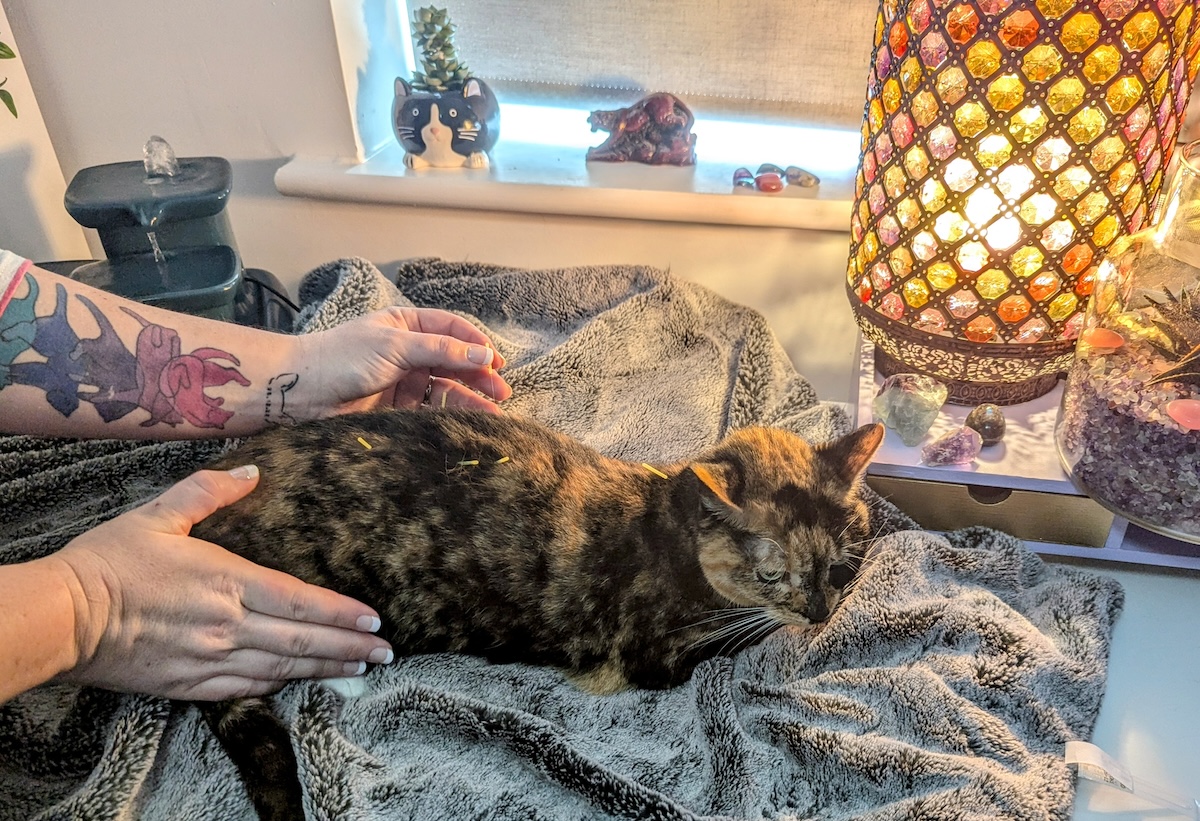
Hi, I’m Dr. Karyn! Read my introduction to learn more about me and meet my five hilarious cats: Clutch, Cyril, Alex, Zelda, and Zazzles.
Acupuncture has been around for thousands of years; at least as far back as 300 B.C.E. when Chinese emperor Huangdi wrote the text known as “The Yellow Emperor’s Classic of Internal Medicine”, but possibly even earlier.1 The 5300-year-old mummified remains of a man found in the Italian Alps showed tattoo markings and corresponding bone impressions that archaeologists believe may have served as markers for needle treatments, meaning that acupuncture is not just ancient, it may also have multiple origins.
Until recently, most Traditional Chinese Medicine practices were treated with derision by the modern medical community, seen as old fashioned and outdated. So what has changed?
Apart from the thousands, if not millions, of anecdotal success stories, a greater understanding of how acupuncture actually works has allowed this non-invasive technique to find a place in mainstream medicine.
The Basics of Acupuncture
In the briefest possible terms, traditional acupuncture uses ‘dry’ needles placed at certain locations along meridians to manipulate and unblock ‘Qi’ (pronounced ‘chee’) – the body’s life force energy. These meridians correlate to different parts of the body, though not every point along that meridian affects those body parts.
Meridian
Abbreviation
Meridian
Abbreviation
Heart
HT
Small Intestine
SI
Lung
LU
Liver
LR
Stomach
ST
Gallbladder
GB
Kidney
KI
Bladder
BL
Pericardium
PC
Spleen
SP
Large Intestine
LI
Triple Energizer
TE
Extra Meridians
Conception Vessel
CV
Governor Vessel
GV
We now appreciate that meridians may actually link back to tissue differentiation during embryonic development, while Qi could be another way of describing nerve pathways, tissue planes, and energy transfer. From here, it becomes easier for dedicated scientists to appreciate how this ‘alternative’ therapy might actually work.
Zazzles relaxing into acupuncture
Embracing Holistic Treatment for Pets
After attending a course on veterinary acupuncture, I became obsessed with using this technique in practice. Although the majority of my acupuncture patients were of the canine variety, feline acupuncture arguably has a greater potential for success. Cats have been found to respond more strongly to acupuncture, and there have been promising results in its use in managing feline asthma.
I have been using acupuncture at home on my Labrador, Bailey, whose joints are feeling their age. Recently, I decided to introduce Zazzles, our timid tortie, to this treatment and I was astounded with the results! When we rescued Zazzy eight years ago, we became aware of a poorly healed fracture on one of her hind legs. She has coped with this very well, but recently she has started to limp, so we decided it was time to get started on a pain management plan. Being quite a nervous girl, I wasn’t sure how she would respond to this unusual form of stimulation, but far from being afraid, she actually rolled over purring!
It’s a little too soon to know how well the treatments are going to work, but at least I know that there’ll be no problem repeating them!
Don’t Try This At Home!
Obviously, acupuncture isn’t something you can do at home on your own pets, but you can try some acupressure and massage.
As the name suggests, acupressure involves using targeted pressure over specific areas, such as those used for acupuncture, to achieve similar results without a needle. It is a technique that just about anyone can use to help relieve tension, provide pain relief, and soothe their pets at home. In addition, if you have a cat that suffers with respiratory issues like asthma, there are a couple of pressure points you may like to try:
Massaging a cat is pretty straightforward, with very little difference between it and regular stroking. The main thing to be aware of is applying firmer pressure either side of the spine with the palm of your hand, as well as focusing on the neck and shoulders. The only trouble you’re likely to run into is when you try to stop!
Feline massage is all about flat pressure and slow strokes.
If you think your cat may benefit from acupuncture, talk to your vet. Not all vets and veterinary practices will offer this service, so you may need to look around. Rest assured that, far from being a stressful experience, most cats find acupuncture to be quite relaxing!
This article is a part of Dr. Karyn’s series with her five hilarious cats.






